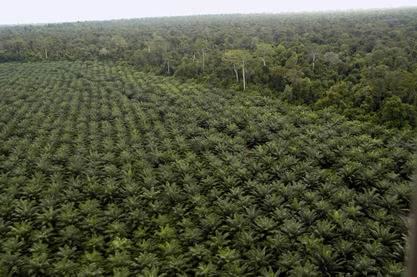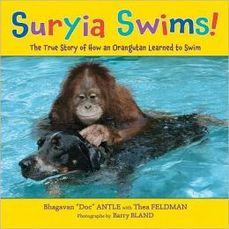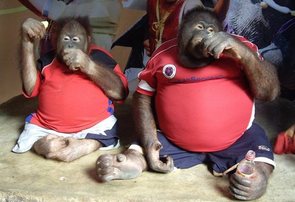Issues
 Photo copyright www.theitinerant.co.uk
Photo copyright www.theitinerant.co.uk
Palm Oil
The single greatest threat facing wild orangutans today is the rapidly expanding palm oil industry. Rainforests are being cleared at the rate of 300 football fields per hour to make way for oil palm plantations. While there are millions of hectares of oil palm degraded land that could be used for plantations, many oil palm companies choose instead to use rainforest land to make additional profits by logging the timber first. Palm oil companies also frequently use uncontrolled burning to clear the land, resulting in thousands of orangutans being burned to death. Those that survive have nowhere to live and nothing left to eat. Learn more about palm oil and its impact on orangutans here.
The single greatest threat facing wild orangutans today is the rapidly expanding palm oil industry. Rainforests are being cleared at the rate of 300 football fields per hour to make way for oil palm plantations. While there are millions of hectares of oil palm degraded land that could be used for plantations, many oil palm companies choose instead to use rainforest land to make additional profits by logging the timber first. Palm oil companies also frequently use uncontrolled burning to clear the land, resulting in thousands of orangutans being burned to death. Those that survive have nowhere to live and nothing left to eat. Learn more about palm oil and its impact on orangutans here.
 Photo from barnesandnoble.com
Photo from barnesandnoble.com
Orangutans in the Entertainment Industry
In captivity, orangutans continue to be exploited by the entertainment and advertising industries. While the public’s awareness of animal welfare concerns has grown in recent years, there remains a stubborn disconnect between such sensitivities and the use of apes in live stage shows, television and movie productions, advertisements, “lighter side of the news” segments, etc. The orangutans used in such venues are always infants or juveniles; they are removed from their mothers prematurely and trained to work as performers until they grow too large and powerful to be controlled. At that point, the apes are placed back in the animal-dealer trade and all too often in very inhumane conditions, caged as breeding stock to produce more infants, or relegated to small, hidden cages for the remainder of their very long lives (orangutans can live more than 50 years, but can only be safely handled for the first 6-8). Click here to read more about how the entertainment industry uses orangutans.
In captivity, orangutans continue to be exploited by the entertainment and advertising industries. While the public’s awareness of animal welfare concerns has grown in recent years, there remains a stubborn disconnect between such sensitivities and the use of apes in live stage shows, television and movie productions, advertisements, “lighter side of the news” segments, etc. The orangutans used in such venues are always infants or juveniles; they are removed from their mothers prematurely and trained to work as performers until they grow too large and powerful to be controlled. At that point, the apes are placed back in the animal-dealer trade and all too often in very inhumane conditions, caged as breeding stock to produce more infants, or relegated to small, hidden cages for the remainder of their very long lives (orangutans can live more than 50 years, but can only be safely handled for the first 6-8). Click here to read more about how the entertainment industry uses orangutans.

Orangutans as Pets
There is something irresistible about an infant primate – they are magnetically appealing, with their wide eyes and open expressions, and they seem so much like an adorable human infant. However, those cuddly babies grow up into intelligent, incredibly strong, willful adults, and they can never be managed appropriately in a human household. Click here to read about why orangutans should never be pets.
There is something irresistible about an infant primate – they are magnetically appealing, with their wide eyes and open expressions, and they seem so much like an adorable human infant. However, those cuddly babies grow up into intelligent, incredibly strong, willful adults, and they can never be managed appropriately in a human household. Click here to read about why orangutans should never be pets.
